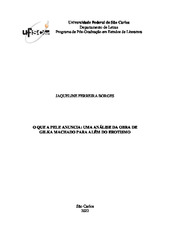Mostrar el registro sencillo del ítem
O que a pele anuncia: uma análise da obra de Gilka Machado para além do erotismo
| dc.contributor.author | Borges, Jaqueline Ferreira | |
| dc.date.accessioned | 2022-06-01T19:27:46Z | |
| dc.date.available | 2022-06-01T19:27:46Z | |
| dc.date.issued | 2022-02-16 | |
| dc.identifier.citation | BORGES, Jaqueline Ferreira. O que a pele anuncia: uma análise da obra de Gilka Machado para além do erotismo. 2022. Tese (Doutorado em Estudos de Literatura) – Universidade Federal de São Carlos, São Carlos, 2022. Disponível em: https://repositorio.ufscar.br/handle/ufscar/16231. | * |
| dc.identifier.uri | https://repositorio.ufscar.br/handle/ufscar/16231 | |
| dc.description.abstract | This thesis aims to analyze the work of Gilka Machado (1893-1980) as the result of the process of constructing poetry and the poet, considering that there is a thematic diversity between the poems of the first book, Cristais Partidos (1915); and the last one, Velha Poesia (1965). To carry out the research, the corpus is Poesia Completa (2017), the second re-edition of the 1978 work and a book that brings together six of the ten titles published by Gilka Machado. Regarding the content of the verses, there is a duality between body and soul that moves the eroticism of the works, as well as a mobilization of the poetic persona that claims agency and voice for the black women of their time. There is a constant questioning about the place of women, which in the poems happens through the description of the senses and poetic devices such as metaphor, alliteration and assonance, building verses of artistic and political manifestation. This thesis observes freedom as an impulse for eroticism, a political act that manifests itself through the poems; also the concept of “Amefricanidade”, by GONZALEZ (2020), theorist that underlies the discussions of race, alongside CARNEIRO (2011) and FANON (2008). The concepts of DAL FARRA (2016) are substantial to think about the trajectory of the writer, as well as AGAMBEN (2007), FOUCAULT (2010) and BOURDIEU (1989), to build the hypothesis of symbolic death and the erasure imposed on the poet who appears especially in the last books, when loneliness permeates all the poems. Finally, the concepts of PAZ (1994) subsidize the discussions about form and poetry in the face of the smokescreen constructed by the critic to limit poetics to eroticism. | eng |
| dc.description.sponsorship | Não recebi financiamento | por |
| dc.language.iso | por | por |
| dc.publisher | Universidade Federal de São Carlos | por |
| dc.rights | Attribution-NonCommercial-NoDerivs 3.0 Brazil | * |
| dc.rights.uri | http://creativecommons.org/licenses/by-nc-nd/3.0/br/ | * |
| dc.subject | Poesia | por |
| dc.subject | Amefricanidade | por |
| dc.subject | Silenciamento | por |
| dc.subject | Morte simbólica | por |
| dc.subject | Gilka Machado | por |
| dc.subject | Poetry | eng |
| dc.subject | Africanity | eng |
| dc.subject | Silencing | eng |
| dc.subject | Symbolic death | eng |
| dc.title | O que a pele anuncia: uma análise da obra de Gilka Machado para além do erotismo | por |
| dc.title.alternative | What does the skin announce: an analysis of the work of Gilka Machado beyond eroticism | eng |
| dc.type | Tese | por |
| dc.contributor.advisor1 | Martha, Diana Junkes Bueno | |
| dc.contributor.advisor1Lattes | http://lattes.cnpq.br/1857520068239671 | por |
| dc.description.resumo | Esta tese tem como objetivo analisar o conjunto da obra de Gilka Machado (1893-1980) como o resultado do processo de construção da poesia e da poeta, considerando que há uma diversidade temática entre os poemas do primeiro livro, Cristais Partidos (1915); e o último, Velha Poesia (1965). Para a realização da pesquisa, o corpus é Poesia Completa (2017), segunda reedição da obra de 1978 e livro que reúne seis, dos dez títulos publicados por Gilka Machado. No que se refere ao conteúdo dos versos, percebe-se uma dualidade entre corpo e alma que movimenta o erotismo das obras, assim como uma mobilização da persona poética que reivindica agência e voz para as mulheres negras de seu tempo. Há um constante questionamento sobre o lugar da mulher, que nos poemas acontece através da descrição dos sentidos e de expedientes poéticos como a metáfora, aliteração e assonância, construindo versos de manifestação artística e política. Esta tese observa a liberdade como impulso para o erotismo, ato político que se manifesta através dos poemas; também o conceito de Amefricanidade, de GONZALEZ (2020), teórica que fundamenta as discussões de raça, ao lado de CARNEIRO (2011) e FANON (2008). Os conceitos de DAL FARRA (2016), são substanciais para pensar a trajetória da escritora, assim como AGAMBEN (2007), FOUCAULT (2010) e BOURDIEU (1989), para construir a hipótese de morte simbólica e do apagamento imposto à poeta que surge principalmente nos últimos livros, quando a solidão perpassa todos os poemas. Por fim, os conceitos de PAZ (1994) subsidiam as discussões sobre a forma e a poesia frente à cortina de fumaça construída pela crítica para limitar a poética ao erotismo. | por |
| dc.publisher.initials | UFSCar | por |
| dc.publisher.program | Programa de Pós-Graduação em Estudos de Literatura - PPGLit | por |
| dc.subject.cnpq | LINGUISTICA, LETRAS E ARTES::LETRAS::LITERATURA BRASILEIRA | por |
| dc.publisher.address | Câmpus São Carlos | por |
| dc.contributor.authorlattes | http://lattes.cnpq.br/2429642679832671 | por |


